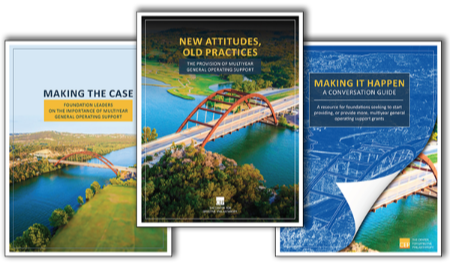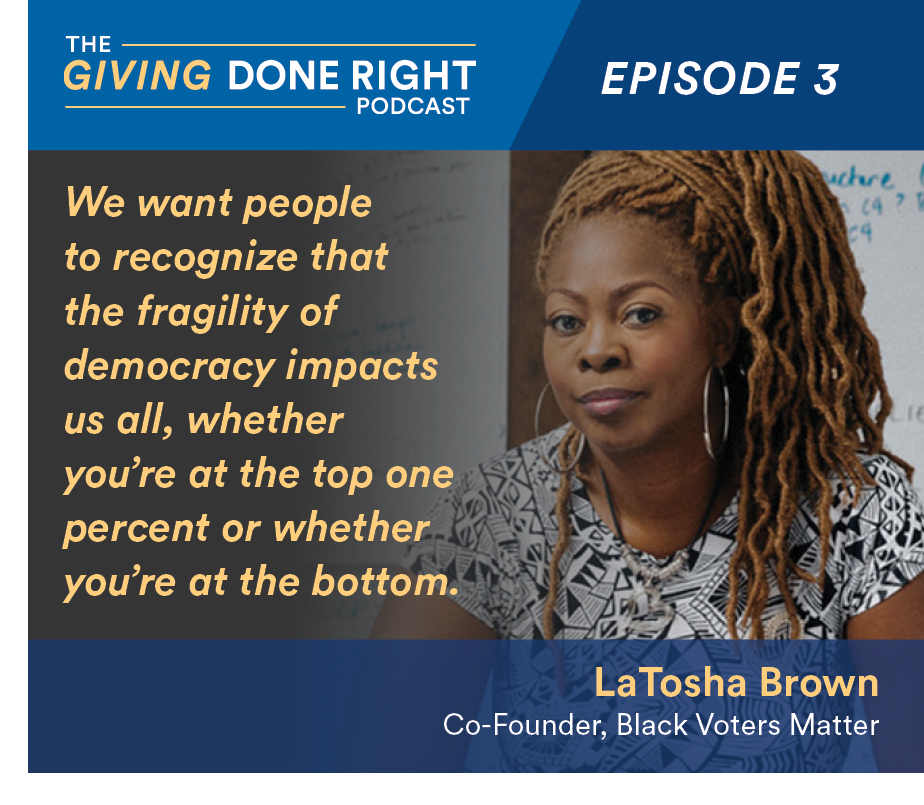When It Comes to Multiyear General Operating Support, New CEP Research Finds Disconnect Between Foundation Leaders’ Attitudes and Practices

Multiyear general operating support (GOS) provides nonprofits with the flexibility to use funds to fulfill their missions and the ability to plan for the long term. But although nonprofit leaders have long called for these types of grants — and although the chorus of advocates in philanthropy arguing that multiyear GOS constitutes good grantmaking practice has grown louder — many foundations provide no multiyear GOS grants, and those that do only provide them to a small percentage of grantees.
This is one of the key findings from New Attitudes, Old Practices: The Provision of Multiyear General Operating Support, a CEP study released last week that examines the state of practice in philanthropy. As the report shows, foundation leaders’ attitudes about GOS have shifted over the years, but practices have not.
The report is accompanied by two companion publications: Making the Case: Foundation Leaders on the Importance of Multiyear General Operating Support and Making It Happen: A Conversation Guide. Making the Case includes profiles of five foundations that participated in interviews for this study: the California Wellness Foundation, the Claneil Foundation, Foundation for a Just Society, Mary Reynolds Babcock Foundation, and Paul Hamlyn Foundation. Making It Happen provides resources for foundation leaders and boards seeking to start providing, or provide more, multiyear GOS grants.
For an overview of the research, check out coverage in The Chronicle of Philanthropy, as well as a blog post from Ellie Buteau, CEP’s vice president, research, and co-author of the report, that provides more color on the study’s big takeaways. And of course, we hope you’ll download and read these publications in full. As always, we welcome your thoughts and reactions.
Download the report here.
More to Come Soon
The data for New Attitudes, Old Practices was collected prior to the onset of the COVID-19 pandemic. CEP is now examining whether and to what extent foundation practices are changing because of a dramatically changed context.
“With the enormous challenges nonprofits are now facing, the need for multiyear GOS is clearly greater than ever before,” said CEP President Phil Buchanan in a press release. This new research effort is also looking at other elements of foundations’ crisis response, including grant spending levels and what foundations are doing with respect to supporting communities of color and organizations led by people of color.
The Ford Foundation provided funding to support both these research efforts. Stay tuned for the release of these new findings in the coming weeks.
Are you all caught up on the Giving Done Right podcast?

Season 1 of Giving Done Right, a new podcast from CEP with everything you need to know to make an impact with your charitable giving, is off and running this fall! Every Thursday, hosts Grace Nicolette and Phil Buchanan are welcoming onto the program leaders and experts from throughout the nonprofit and philanthropic sector to answer philanthropy’s burning questions and bust some myths that have long plagued donors and nonprofits alike.
Just tuning in? Here’s your primer on what to catch up on so far this season:
Episode 1: “Change, Not Charity”
Jacqueline Martinez Garcel, CEO of the Latino Community Foundation (LCF), discusses the importance of investing in community leaders, why donors should consider racial equity to maximize the good they can do, and strategies for how donors can tap into their communities to find the right organizations to support.
Episode 2: “Giving Until it Hurts: Pain, Faith, and Purpose”
Jason Hackmann, an entrepreneur and major donor who has been investing deeply in efforts to end childhood slavery in Ghana, reflects on the role that personal experience and faith played in motivating him to identify and give meaningfully to a particular cause. He also shares guidance on determining the right threshold for how much to give and the importance of spending time with the people affected by the problem you’re seeking to alleviate.
Episode 3: “Holding up the Roof: How Philanthropy Can Bolster Democracy”
LaTosha Brown, co-founder of Black Voters Matter — an organization working to fight voter suppression and build power in marginalized, predominantly Black communities — talks about her experience as an organizer and an intermediary, and discusses the role that donors can play in strengthening democracy.
Episode 4: “Making and Measuring Impact” with Tiffany Cooper Gueye
Tiffany Cooper Gueye, chief operating officer at Blue Meridian Partners and former CEO of the national education nonprofit BellXcel, draws on her experiences as both a nonprofit leader and a funder, as well as her expertise in measurement and evaluation, to talk about how donors can better understand what works.
We’re midway through Season 1 and there’s still lots more great conversation to come. Subscribe today on Apple Podcasts, Spotify, Stitcher, or Google Podcasts and never miss an episode. And don’t forget to leave a rating and review!
Early-bird discount deadline for 2021 CEP assessments extended to this Friday!
The deadline to take advantage of an early-bird discount offer on any CEP assessment or customized advisory services engagement in 2021 has been extended to this Friday. This is the only discount window for next year’s assessments, so don’t delay!
Philanthropy needs to listen to its stakeholders now — carefully, regularly, and comprehensively — to rise to the challenge and be truly effective in its work in 2021. CEP’s assessments can help. We’ve added new survey questions and approaches to ensure that funders hear candidly from important partners about the topics that matter most right now. In particular, our surveys include a number of questions specifically focused on racial equity — including questions that help funders understand how much of their grantmaking is ultimately intended to benefit historically disadvantaged groups (particularly BIPOC communities and individuals), and questions that ask grantees to assess aspects of their funder’s commitment to diversity, equity, and inclusion.
Read more about how CEP is evolving its assessments to help funders ask the right questions for meeting the moment in this blog post from Mena Boyadzhiev and Sonia Montoya, and for those interested in learning more about the Grantee Perception Report (GPR) in particular, register for this free webinar on November 18 with the Denver Foundation discussing their experience learning from — and acting on — grantee feedback.
Contact CEP Director, Assessment and Advisory Services, Austin Long by the end of this week to receive a discount on your 2021 assessment!
Upcoming Virtual Events
CEP leaders have been busy sharing data and insights in virtual conversations about this critical moment for nonprofits and philanthropy. Upcoming webinars include:
October 29 (tomorrow!): Nonprofits in Crisis: Navigating a Perilous Moment
Hosted by the Wichita Community Foundation (WCF), this conversation between CEP President Phil Buchanan and WCF President & CEO Shelly Prichard will address several crucial questions funders should be considering right now: What do we know about how nonprofits are faring? In what ways might individual donors and foundations better support these organizations? How can the racial disparities that are on stark display — in terms of the toll of COVID-19 and the economic impact — be countered by nonprofits and philanthropy?
October 29 (tomorrow!): How to Drive Educational Equity with Data
Student voices must be central to any approach to make schools more equitable. Too often, education leaders and funders make decisions without the voices of the people that they are trying to serve, the students — especially low-income students, students of color, and other students who have been historically marginalized. Education funders, join YouthTruth’s Jimmy Simpson, Jr. for a hands-on discussion to help better understand how to use student perception data to drive forward equity work.
November 18: Seeking and Acting on Feedback: A Conversation with The Denver Foundation
There has never been a greater need for foundations to know how grantees are experiencing their relationship and whether they are getting what they need to have impact. But the question remains: what’s the best way to find out? Join Austin Long, CEP’s director of assessment and advisory services, and Dace West, vice president of community impact at the Denver Foundation, for a discussion about how to listen and respond to feedback from your nonprofit partners. Dace will talk with Austin about her recent experience using CEP’s Grantee and Applicant Perception Reports, as well as share the changes that the Foundation has made based on what they learned.
On the Blog
Julio Marcial, vice president of strategic partnerships, writes that general operating support grants are essential if philanthropy is to do the work necessary to shift power to the people experiencing — and solving — community injustices.
Imago Dei Fund Managing Partner Lisa Jackson argues that until philanthropy confronts its inability to trust, it will remain unable to meet all that’s being asked of it in 2020.
“We are all disaster philanthropists,” writes Center for Disaster Philanthropy President and CEO Patricia McIlreavy in a post about how every funder can be effective in response and recovery efforts for the current compounding crises.
Amy Kingman offers five lessons about providing direct assistance to families, gleaned from her experience leading Doris Buffett’s Letters Foundations.
Lucie Addison, learning and improvement lead at Einhorn Collaborative, shares four key lessons learned from Einhorn’s recent strategy transition.
Margaret Dunham, content manager at Taproot Foundation, looks at recent studies by Taproot and CEP to explore how funders can build nonprofit capacity and resiliency during COVID-19.
A Call for Foundations to Step Up Spending
Building on earlier calls from CEP and other philanthropy-serving organizations for funders to step up giving levels in the wake of the COVID-19 crisis, CEP’s Phil Buchanan joined with David Salem, former founding president and chief investment officer of the Investment Fund for Foundations, in calling for foundations to resist “dogmas masquerading as fiscal responsibility” when it comes to grant spending levels.
In a Chronicle of Philanthropy op-ed aimed at foundation board members and CEOs, Buchanan and Salem argue that “the spend-now versus spend-in-the-future calculus is fundamentally altered by today’s events.” They suggest that foundation giving can have a “compounding effect” in terms of social impact in a time of crisis and argue that, while future spending is important, it’s possible for foundations to step up spending levels without threatening their long-term existence.
“The amount of money sitting in endowed foundations has increased dramatically in recent decades,” they write. “For nonprofits on the receiving end of foundation grants, the size of any one particular foundation is much less important than the total grant making of all foundations.”
Support CEP
If you believe in CEP’s work, and if it benefits you and your organization as you seek to do yours, please consider making a grant or an individual contribution to CEP. Supporting CEP means supporting more effective philanthropy.

